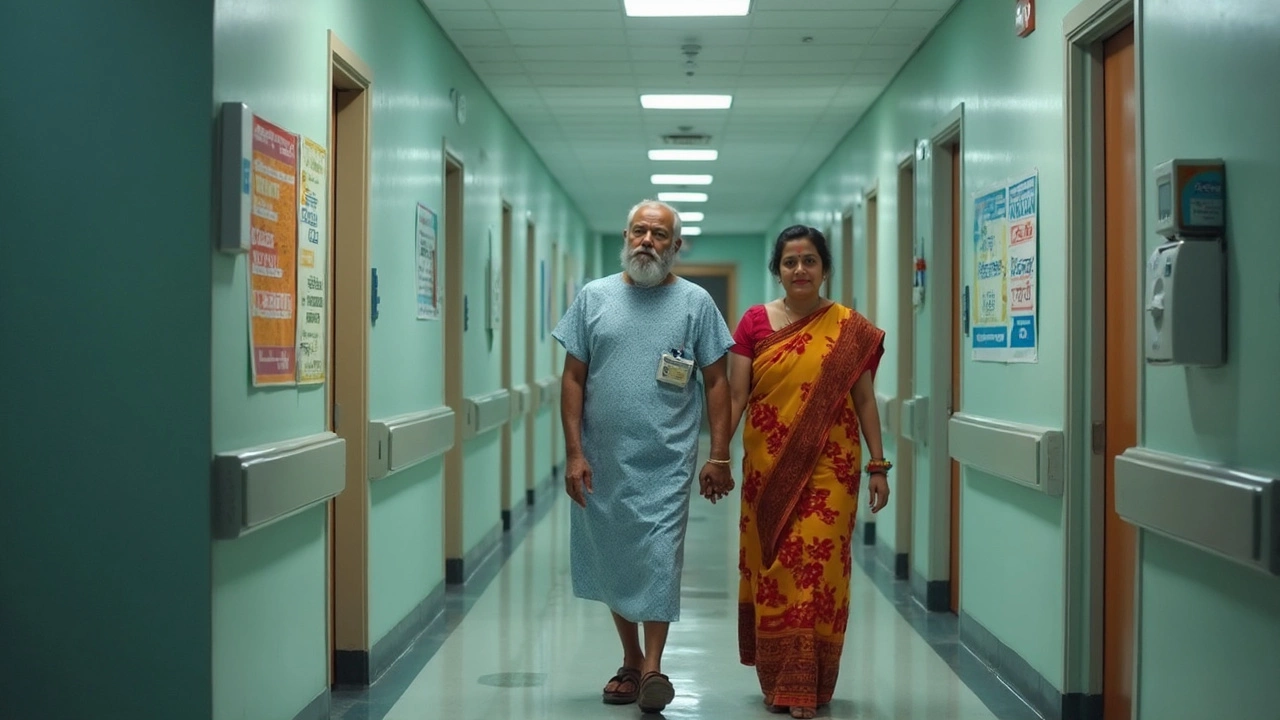The big question on anyone’s mind before going in for heart surgery is how long it’s actually going to take. The answer isn’t as straightforward as you’d hope—because it depends a lot on the type of surgery you’re having. For example, a routine bypass usually takes between three to six hours, but a valve repair or replacement might be shorter or longer depending on surprises that pop up once the docs take a look inside.
Most heart surgeries aren’t speedy affairs. You’ve got check-ins and prep, then the actual operation, and then the slow waking up process. It’s not uncommon to spend the whole day at the hospital just for the operation itself—even though a lot of that time you’re just waiting or sleeping off anesthesia. If you’re caring for a loved one, bring snacks and power up the phone—the waiting can feel endless.
- How Long Does Heart Surgery Really Take?
- Factors That Affect Surgery Time
- What Happens Before and After Surgery?
- Tips and Facts for a Smoother Recovery
How Long Does Heart Surgery Really Take?
If you’re sitting there feeling nervous about how long heart surgery takes, you’re not alone. This is the question everyone asks, and the numbers might surprise you. Heart surgery isn’t just about the time in the operating room—it's the whole shebang, from prep to recovery room.
Let’s look at some real numbers for different types of heart surgery:
- Coronary artery bypass graft (CABG): About 3 to 6 hours. This is probably the most common heart operation. If a surgeon needs to bypass more arteries, it takes longer.
- Valve repair or replacement: Usually 2 to 4 hours, unless there are complications.
- Heart transplant: The big one—can take 4 to 12 hours, depending on how smoothly things go with both the donor and recipient.
- Minimally invasive or robotic procedures: These can be as quick as 1 to 3 hours, but add extra time for setup.
You’re not just looking at surgery time, though. From when you check in to when you’re out of recovery, it can easily add up to 8-12 hours in the hospital, with the actual surgery taking just a piece of that window.
| Type of Heart Surgery | Average Surgery Time |
|---|---|
| Coronary Bypass (CABG) | 3-6 hours |
| Valve Repair/Replacement | 2-4 hours |
| Heart Transplant | 4-12 hours |
| Minimally Invasive Surgery | 1-3 hours |
Why such a range? No two hearts (or surgeries) are the same. An experienced team might finish a simple valve replacement quickly, but a complicated bypass with a few surprises could easily stretch past six hours. Some folks even spend extra time in the OR because their heart needs more support starting up again.
Bottom line: pack patience. Bring something to keep your mind busy, or prep loved ones for the long haul, especially if the doctor gives a range instead of a specific number. And don’t stress if things run late—slow and steady is the name of the game in heart surgery.
Factors That Affect Surgery Time
You might think heart surgery is like a car repair—the doc just swaps out a part and you’re done. Not so simple. A bunch of things can make the clock tick faster or slower in the operating room.
- Type of surgery: Bypass, valve repair, and minimally invasive procedures all take different amounts of time. Coronary artery bypass tends to take about 3-6 hours, while more complex surgeries, like multiple valve repairs, can last 8 hours or even more.
- Surgeon's Experience: A surgeon who’s done thousands of these can get the job done quicker (and sometimes safer) than someone who just started doing heart operations. The team’s chemistry matters, too.
- Patient’s condition: Is this an emergency? Are there other health problems, like diabetes, obesity, or lung issues? If the patient has a complicated medical history, everything slows down because the team has to be extra careful.
- Unexpected surprises: Sometimes things pop up mid-surgery—a tricky spot of scar tissue, bleeding that’s hard to stop, or trouble getting the heart-lung machine working. These hiccups mean more time on the table.
- Age: Older patients sometimes need more time under anesthesia, since their bodies don't bounce back as fast.
- Anesthesia and prep time: People forget that a chunk of those hours is for getting you ready for the actual heart surgery and making sure everything’s safe before making any cuts.
Here’s the kind of breakdown families actually experience:
| Step | Time Range |
|---|---|
| Prep & Anesthesia | 1-2 hours |
| Actual Surgery | 3-8 hours |
| Waking Up & Moving to ICU | 1-2 hours |
So when people ask, “how long does heart surgery take?” the honest answer is you’re usually in it for the whole day. And if the operation is extra complex or the patient isn’t in tip-top shape, it can stretch even longer.

What Happens Before and After Surgery?
The day before heart surgery usually starts early—think of it like prepping for a big trip. You meet your surgeon, go over last-minute details, and get checked for stuff like your blood pressure and current meds. The hospital might ask you to stop eating or drinking after midnight. This isn’t just to keep you hungry; it’s because anesthesia works best on an empty stomach.
Before heading into the operating room, you’ll trade your clothes for a hospital gown, get an IV, and meet the anesthesia team. They’ll explain what you’ll feel as you drift off. If you’re nervous, it’s totally normal—they see it every day. You might even get some meds to calm those nerves.
- Your heart surgeon marks the spot (yes, sometimes with a marker) to avoid any confusion.
- You may get a quick chest shave if needed for better access and cleaner work.
- Family or friends usually get sent to a waiting area—and the hospital staff keeps them in the loop.
Right after heart surgery wraps up, you move to the ICU. Expect a lot of wires and monitors—beeping isn’t a bad sign. Nurses are on you like hawks. The breathing tube is still in, but they remove it as soon as you’re awake and breathing on your own.
The first few hours are super important. Docs watch for bleeding, blood pressure swings, or heart rhythm blips. It’s normal to feel groggy, sore, and a bit confused. They’ll ask you to wiggle your toes or squeeze hands; yep, that’s on purpose, not them being weird.
Usually, you’ll stay in the ICU for a day, then a regular hospital room for a few days. Here’s a quick look at what goes down after the operation:
| Time After Surgery | What Typically Happens |
|---|---|
| First 24 hours | ICU, monitoring, tube removal, early movement if stable |
| 24-72 hours | Transferred to normal room, regular check-ups, pain management, first walks |
| Day 3-5 | More mobility, breathing exercises, talking to physical therapists about going home |
Don’t stress if you’re not yourself right away. Getting over heart surgery takes time. Hospital staff will nag you (in a good way) about sitting up, breathing exercises, and even coughing. That's all to keep your lungs and blood flow in good shape, speeding up your recovery and lowering chances of problems.
Tips and Facts for a Smoother Recovery
Getting through heart surgery is a huge deal, but the work isn’t over once you wake up. Recovery is its own beast. Here’s what helps it go better, straight from folks who’ve been through it and from what doctors really tell you (not just the happy brochure stuff).
- Move, but don’t overdo it: Walking is super important. The sooner you’re up—even if it’s just a slow shuffle with a nurse—the better for your lungs and circulation. Most hospitals aim to get people up the day after heart surgery.
- Stick to your meds: Take everything as prescribed. Skipping pain meds makes it harder to breathe deep or move around. Missing blood thinners or other stuff can lead to real trouble.
- Keep the wound clean and dry: No swimming or soaking in tubs until your doctor clears you. Most people can shower after a few days, but pat the incision dry, don’t rub.
- Sleep matters: Lying flat may be tough at first. Use pillows to prop yourself up—some people even prefer sleeping in a recliner for the first week or two.
- Don’t freak out about the scar: Everyone gets one, and it usually fades a lot within a year.
- Ask for help: Accept that you’ll need it, even when it annoys you. Things like getting groceries, lifting laundry, or driving are out for a bit.
Let’s get real about timelines. Most people who have a standard bypass say it takes about 6-8 weeks before they feel mostly "normal" again, and about 3 months to get back to heavier activities. It’s different for everyone though. Age, how fit you were before, and the type of heart surgery all play a big part.
| Activity | When Most People Resume |
|---|---|
| Walking short distances | Within 1-3 days |
| Driving | 4-6 weeks |
| Work (desk job) | 6-8 weeks |
| Heavy lifting | 3 months or longer |
Watch out for these warning signs as you heal: fever, chest pain that doesn’t go away, wound redness, or swelling in your legs. Call your doctor right away if any of that pops up.
If you want to help yourself out, do your breathing exercises, eat healthy, and keep every follow-up appointment—even if you’re feeling okay. Every bit helps when you’re getting over heart surgery.






